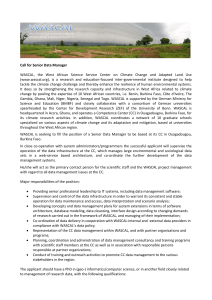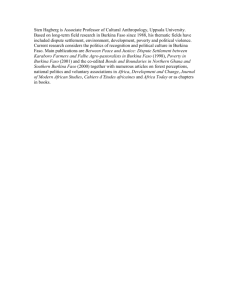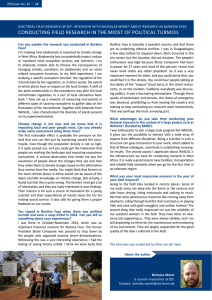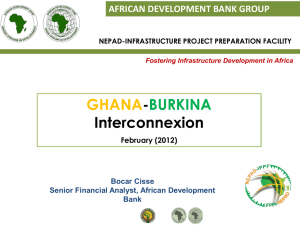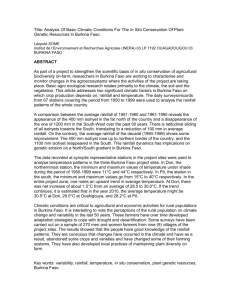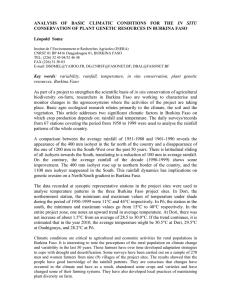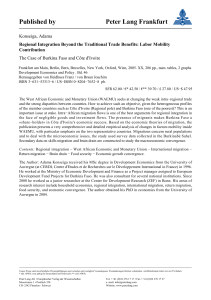Final international conference session 2 Bhaduri
advertisement
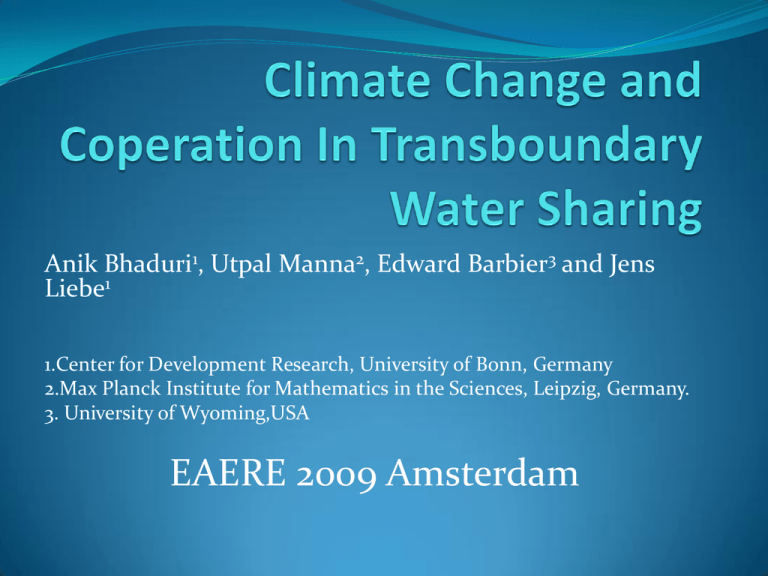
Anik Bhaduri1, Utpal Manna2, Edward Barbier3 and Jens Liebe1 1.Center for Development Research, University of Bonn, Germany 2.Max Planck Institute for Mathematics in the Sciences, Leipzig, Germany. 3. University of Wyoming,USA EAERE 2009 Amsterdam Climate Change and Water Conflict IPCC Report (2008): The impact of Global climate change on water resources could be significant. Uncertainty in rainfall, and in the availability of water could lead to an increase in demand for irrigation of surface water. Conflict could be outcome (Stern Report). In a transboundary setting, where multiple countries share a river, conflict could be much higher. Coperation and Conflict are the two sides of the same coin........ Cooperation has consistently dominated water relating conflicts in the past. However, there are cases where there is limited scope of cooperation. Even under conditions of limited scope of cooperation, there is a possibility of attaining agreement, through linking to issues of mutual interest to the parties. The Volta Basin: 5% 42% 4% 6% 3% 40% • 400,000 km2 • 6 riparian countries • 20+ million inhabitants + Expansion of irrigated Major Challenge in the Volta Basin foragriculture Water Resources Management Hydropower generation at Akosombo Irrigation Development in Burkina Faso and Ghana Expansion of irrigated Major Challenge in the Volta Basin foragriculture Water Resources Management Hydropower generation at Akosombo Expansion of irrigated Major Challenge in the Volta Basin foragriculture Water Resources Management Hydropower generation at Akosombo Objective Scope of sharing of river given the uncertainty of the water resources. Issue linkage to water sharing could be hydropower export from Ghana to Burkina Faso. Sustainability of cooperation under climate change issue. Structure A stochastic differential Stackelberg leader-follower game in a setting where Ghana offers a discounted price for energy export to the upstream country, Burkina Faso, for more water in the downstream. Compare both the cooperative as well as non cooperative outcomes in a possible climate change scenario. Lit review Fisher and Rubio(et. al. 1997) Tsur and Graham Tomasi 1991. Knapp and Olson (1995) Chatterjee , Howitt and Sexton(1998). Model Describtion WB Total renewable fresh water resources in the upstream country, Burkina Faso. dW B BW B dz B R-The runoff in downstream country, Ghana. dR Rdz R R αi i=B, G: The rate of water utilization of country i. wi i=B, G: The total per capita fresh water utilization in country i wB =αB WB wG =αG WG =αG [(1- αB )WB+R] Model Describtion(continued) S: The stock of water in the Akosombo Dam where hydropower is produced. dS=(1-αG})((1-αB)WB+R)dt, S(0) = S0 the state equation SS the minimum level (critical level) of water in the reservoir. Bi(wi): Benefit function for water consumption by country i. Ci(αi): Cost function for water irrigation by country i. Hi(S): Net consumer surplus from hydropower generation. Burkina Problem Burkina Faso's maximization problem: r B B J E max e NB d B t dW W dz B subject to Net benefit of Burkina Faso B B B NB B ( w ) C ( ) B And r -Discount rate (constant). B B B B Ghana‘s problem Ghana's maximization problem: r G J G E max e NB d G t dS (1 - G )((1- B )W B R)dt subject to the state equation where W^B and R are given by the stochastic equations dW W dz Net benefit of Ghana B B B dR R Rdz R B NB B (w ) H (S ) C ( ) G G G G G G Burkina Faso‘s water abstraction Burkina Faso will increase its water abstraction with increase in variance in water supply irrespective of the level of water realization. However, the rate of increase will be lower if the country has concave marginal benefit function. Ghana‘s water abstraction There exists an optimal value for the water abstraction rate of Ghana, which will decrease or increase with the increase in variances during low or high extreme events respectively. Ghana‘s reaction function Ghana will decrease its water abstraction with increase in the water abstraction rates of Burkina Faso. The rate of decline will be higher with increase in variance in water supply caused by climate change. Structure of the Game- A stochastic Differential Stackelberg Game Burkina Faso moves first. Burkina Faso announces to the follower the policy rule (t ) S (t ) B Ghana taking this rule as given, seeks to maximize its payoff, which yield the follower's reaction function. G (t ) ( S (t ), (.)) Burkina Faso knowing this reaction function, chooses among all possible rules (.) one that maximizes its objective function. Ghana‘s Problem Assume quadratic policy rule for Burkina Faso B aS 2 b is known. G r G J E max e NB d Ghana's maximization problem: G t Subject to the state and flow equations, and constraint. Burkina Faso‘s Problem Assuming that the downstream country Ghana play the Markovian strategy, G ( S (t ), a (t ), b(t )) the upstream country Burkina Faso chooses the optimal water abstraction rate under cooperation by solving J B E max e r NB B d a ,b t subject to the same state and flow equations, and constraint. Only difference is in the net benefit function NB B B B ( w B ) H B ( S , B ) C B ( B ) Ghana‘s Reaction Function Under cooperation Burkina Water abstraction with cooperation There exists an optimal value for the water abstraction rate of Burkina Faso, which will decrease with variance at higher level of water abstraction and increase with variance at lower level of water abstraction respectively. Ghana water abstraction Water abstraction rate of Ghana will decrease in low extreme event (drought)with the increase in variances. However, the rate of decline will be lesser in the case with higher level of cooperation. Without co-operation With co-operation Burkina Faso will increase its water abstraction with increase in variance irrespective of low or high extreme events Burkina Faso will increase its water abstraction with increase in variance at lower level of water abstraction of Burkina Faso while decrease its water abstraction at higher level of water abstraction of Burkina Faso Ghana will decrease its water abstraction with increase in variance Ghana will decrease its water abstraction with increase in variance but the rate of decrease is much lower here. Ghana‘s water abstraction is at a lower level Ghana‘s water abstraction is at a higher level Ghana will decrease its water abstraction if Burkina Faso increase its water abstraction If Burkina Faso increase its water abstraction, Ghana will only decrease its water abstraction during initial phase of cooperation . Comparison Chart Conclusion How countries might gain from cooperation during climate change? We have shown that issue linkage can help the countries to cooperate in the event of climate change In a stochastic differential game, we have shown the existence of equilibrium conditions for cooperation . Also the long run steady state is stable even with increasing variances of water flow. Further applications-Central Asia This paper could provide a theoretical basis in the development of DSS-the model can provide outputs in a time frame and based on past actions(markovian). Thanks
